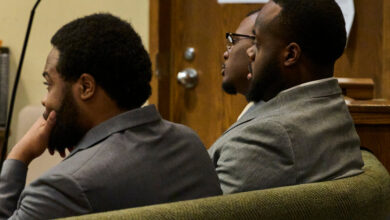This Alabama City Faces a Culture War, With Its Public Library at the Center

The public library is one of the biggest civic buildings in Fairhope, Ala. Almost every day across its 40,000 square feet in the heart of downtown, retirees gather for book club in the auditorium, teenagers play chess upstairs, and toddlers learn their letters at story time. Its light-filled reading room features a vaulted ceiling that rises above a stained glass depiction of two owls poring over a book.
The library records more than 180,000 annual visits, one of the highest figures in Alabama, in a city of 25,000. It has been called Fairhope’s Taj Mahal.
Now, it is also a battleground. Residents have packed meetings of the City Council and the library board, debating books with sexual content or L.G.B.T.Q. themes. Some demand that those books be moved to the adult section. Others argue that amounts to censorship and discrimination. The acrimony resembles fights playing out in libraries across the country, as conservative parents and activists challenge such books.
In March, the conflict in Fairhope escalated when the state’s library board voted to pause funding to the library unless it moved certain books. Although some localities and counties in the country have moved to defund their own public libraries, the decision in Alabama may have been the first time a local public library was targeted for defunding by a state government, said Jonathan Friedman, who directs U.S. free expression programs at the nonprofit PEN America.
The conflict has created a heated divide in the city, which is about a half-hour drive from Mobile in Baldwin County, on Alabama’s gulf coast. “We have people who are passionate on both sides of this topic — on a lot of different topics, to be honest,” Mayor Sherry Sullivan said. “And I think when they’re passionate about what they do, they don’t really give up.”
The fight in Fairhope is particularly charged given its history. The city was established in 1894 with the aim of creating a utopian community. Fairhope’s founders were devotees of Henry George, a 19th-century economist who saw private land ownership as the driver of economic inequality.
They established a colony in line with his proposal for land to be owned by the community and leased to residents, businesspeople and farmers. They wrote and received so many letters that their post office was known for handling a heavy volume of mail. And they opened one of the first public libraries in Alabama.
Today, Fairhope votes Republican in deeply red Alabama — President Trump won more than three-quarters of the votes cast in the city in November. But the settlers’ belief in the value of public goods and embrace of independent thinkers remain woven into the character of the city, which continues to attract artists, eccentrics and writers. One local novelist, Sonny Brewer, insists Fairhope claims more published authors per capita than anywhere else in America.
Fairhope’s library battle began about two years ago, when some parents became concerned about a display of books for Pride month in the teen section. Conservative groups organized and people began submitting forms asking for a review of titles like “Water for Elephants,” “Parts and Hearts: A Kids (and Grown-Ups) Guide to Transgender Transition” and “The Kite Runner.”
Brian Dasinger, a co-founder of the Faith Family Freedom Coalition of Baldwin County and a leading critic of the library, sees the city’s progressive founding as largely irrelevant today and said it was twisted logic to think that “because Fairhope was founded upon freethinkers, that we’re supposed to allow our children to look at sexually indoctrinating and sexually explicit material.”
The Baldwin County chapter of a group called Read Freely Alabama organized supporters to make sure they were heard at public meetings, too. Elizabeth Williams, who leads the group, found inspiration in the story of Marie Howland, who established Fairhope’s first library in her home in 1900 and who wrote a novel that was banned by the Boston Public Library.
“I represent the side of intellectual freedom,” Ms. Williams said. “We are firmly for parental rights, in that we believe every parent has the right to decide what’s appropriate for their child, but not to decide that for others.”
The City Council never took up a resolution Mr. Dasinger proposed, which would have prohibited the purchase of books “containing any content of a sexual nature” unless they were restricted to the adult section. The library’s director considered requests to move 36 books and decided not to in all but a handful of cases. The books stayed on the shelves.
But opponents found a more receptive audience in front of the Alabama Public Library Service board, which administers state and federal funds.
“I think we absolutely have a duty to make sure that our children are safeguarded from sexually explicit material and that we do put parents back in charge,” said John Wahl, chairman of the board who also leads the state Republican Party.
Last year, the board approved code changes prohibiting libraries from placing any material that is “sexually explicit” in sections accessible to minors. Critics say that label is subjective and vague.
In February, after Mr. Wahl criticized the Fairhope library as “out of control,” more than 100 Fairhope parents wrote in a letter that efforts to force the library to move certain material were “antithetical to the spirit of Fairhope,” whose founders “were inspired by an idea they read in a book.”
At the state board’s meeting in Montgomery in March, Rebecca Watson, a Fairhope parent who leads the local chapter of Moms for Liberty, a conservative political organization, passed out excerpts from books that she said violated the policy, including “Sold,” a novel about a Nepali girl forced into prostitution.
“This book gave me nightmares last night,” Ms. Watson said. “I stayed up almost all night reading these books, and I can’t imagine a child reading this in our library.”
The board voted 5 to 1 to pause the Fairhope library’s funding, about $20,000 for the rest of the fiscal year.
Although that amount represents only a fraction of the library’s roughly $1 million budget, nearly 90 percent of which is covered by the city of Fairhope, many parents were furious. An online crowdfunding campaign drew national attention and quickly raised roughly $40,000 to cover the state funding.
“I don’t like the fact that someone, just anybody, can go to Montgomery and make some comments and cause a pause in our funding, without some further investigation,” Jack Burrell, the City Council president, said at a council meeting after the state library board vote. “That’s not America.”
Weeks after the state board’s decision, Fairhope remains split. Carlie Maridakis, 41, doesn’t bring her 4-year-old and 6-year-old to the library much anymore, in part because she wants to take a stand. She worries that her children could encounter sexual material while browsing and is particularly concerned about books that include L.G.B.T.Q. themes. She feels that the library has ignored parents like her.
“It’s pretty much been, for them: ‘Open and shut, this is a nonissue,’” she said.
Mr. Dasinger said in an interview that Fairhope’s presidential election results indicate that most of the community wants the cited books to be moved. But some residents see no contradiction between their vote for Mr. Trump and their support for the library.
One of them is Catherine King, 71, a director of the Fairhope Single Tax Corporation, an entity that owns around 4,000 acres in town valued at more than $800 million, carrying on the legacy of the city’s founders.
The corporation deeded land to the city to create Fairhope’s crown jewel: a sprawling waterfront park, where children splash in the murky waters of Mobile Bay. Ms. King said it comes down to basic responsibility.
“Don’t tell me I can’t read something,” she said. “I’ll make that decision for me and my child.”
After the funding pause, Mr. Wahl asked the library to move books with sexual content to the adult section, specifically citing eight titles that parents had described at the state board meeting. If the state board is satisfied with the decisions, it could restore funding at its July meeting.
The Fairhope library board maintains it is in compliance with the state code. At its regularly scheduled April meeting, the members discussed two challenged titles, including “Sold,” which was on Mr. Wahl’s list.
They voted to leave the book in the teen section.




